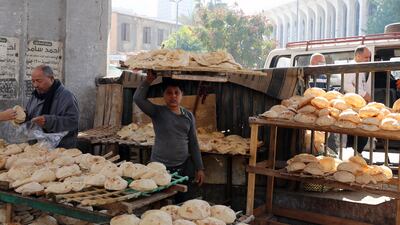Food affordability, not availability, will become an increasing problem for the Middle East, North Africa and sub-Saharan Africa in 2024 because of uncertain crop yields in the world’s biggest producing regions, including Ukraine, a senior EU official told The National.
John Clarke, director for international affairs in the European Commission's directorate general for agriculture and rural development, said he expected that Europe will not be able to produce as much grain as it has in the past two to three years.
The European Commission is the European Union's executive arm.
Mr Clarke said he expected cereal prices to remain stable in 2023 but to increase in 2024.
Fears of a huge disruption to grain supplies after Russia’s invasion of Ukraine in February 2022 were assuaged by a record harvest in Canada last year. Before the war, Russia and Ukraine together supplied 30 per cent and 20 per cent of global wheat and maize exports respectively, according to a UN report published last month.
Market intelligence and rating agency S&P Global said in a 2023 commodities report last month that Canada is expected to harvest 33.8 million metric tonnes of wheat in the marketing year 2022-2023, 51.5 per cent higher on the year, according to Statistics Canada Data.
A surge in global cereal prices was also limited by agreements brokered by world powers that enabled Ukraine to export parts of its wheat production despite the war, Mr Clarke said. “The positive news is that global cereal prices have gone back almost to normal and that’s very good news for the Middle East and North Africa,” he said.
Such agreements include the Black Sea Initiative ― agreed in July between Moscow and Kyiv brokered by the United Nations and Turkey to unblock exports stuck at Ukrainian ports ― and so-called “solidarity lanes”, a mechanism set up in May by Brussels to help Ukraine export its products through its land borders with Poland and Romania.
But fears remain that an escalation of the conflict in Ukraine could reduce grain production in 2024, which will drive prices up and hurt import-dependant developing countries. And there is no certainty that Canada’s 2023 yields will be as high as last year’s while question marks hang over the upcoming Latin American harvest.
“The problem is the affordability [of food], which will be an issue for some Mena countries, for sub-Saharan Africa, for Pakistan and Bangladesh,” Mr Clarke said.
Simulations made by the UN’s Food and Agriculture Organisation show that a sudden and steep reduction in grain and sunflower seed exports by the two countries may be only partially compensated by the release of stocks during the 2022-2023 marketing season.
In a moderate scenario, the world wheat price would increase by 8.7 per cent, but in case of a more severe shock to global grain and oilseed markets, the increase in price is estimated at 21.5 per cent, according to the UN report, titled “The state of food security and nutrition in the world 2022”.
Vulnerable populations in sub-Saharan Africa, the Near East and North Africa are the most at risk of increased undernourishment, because of their high dependency on imported wheat, especially from Ukraine and Russia.
In Egypt, inflation rose to 21.3 per cent in December and the government said earlier this month that it would start selling discounted bread to people outside its food subsidy programme. Egypt is often the world’s largest wheat importer, depending on foreign supplies for more than 50 per cent of its needs.
In Lebanon, which is battling its worst economic crisis yet and is also highly dependent on imports, the price of food increased by 7.6 per cent in December compared with November amid annual inflation of 122 per cent, according to the country’s central administration of statistics.
EU countries will also be hit by further food inflation but it won’t be “a life-threatening issue” Mr Clarke said. The commission’s statistics office, Eurostat, said earlier this month that inflation of food, alcohol and tobacco increased by 13.8 per cent in the euro area.
For the EU and the international community, the aim is to keep the world prices of grain down.
The EU sends food aid to countries like Lebanon but such a move is a short-term solution akin to a “sticking plaster”, Mr Clarke said.
In the medium-term, the EU aims to strengthen its development co-operation to increase productivity, particularly in sub-Saharan Africa. The continent suffers from low productivity – it is equivalent to about one quarter of South-East Asia’s productivity, Mr Clarke said.
“We want that region to become not wholly self-sufficient, because that’s never a good model, but more self-sufficient than it already is,” he said.
“It has good soil and does not have a history of over-use of chemicals and pesticides, so there is real potential to increase productivity.”


